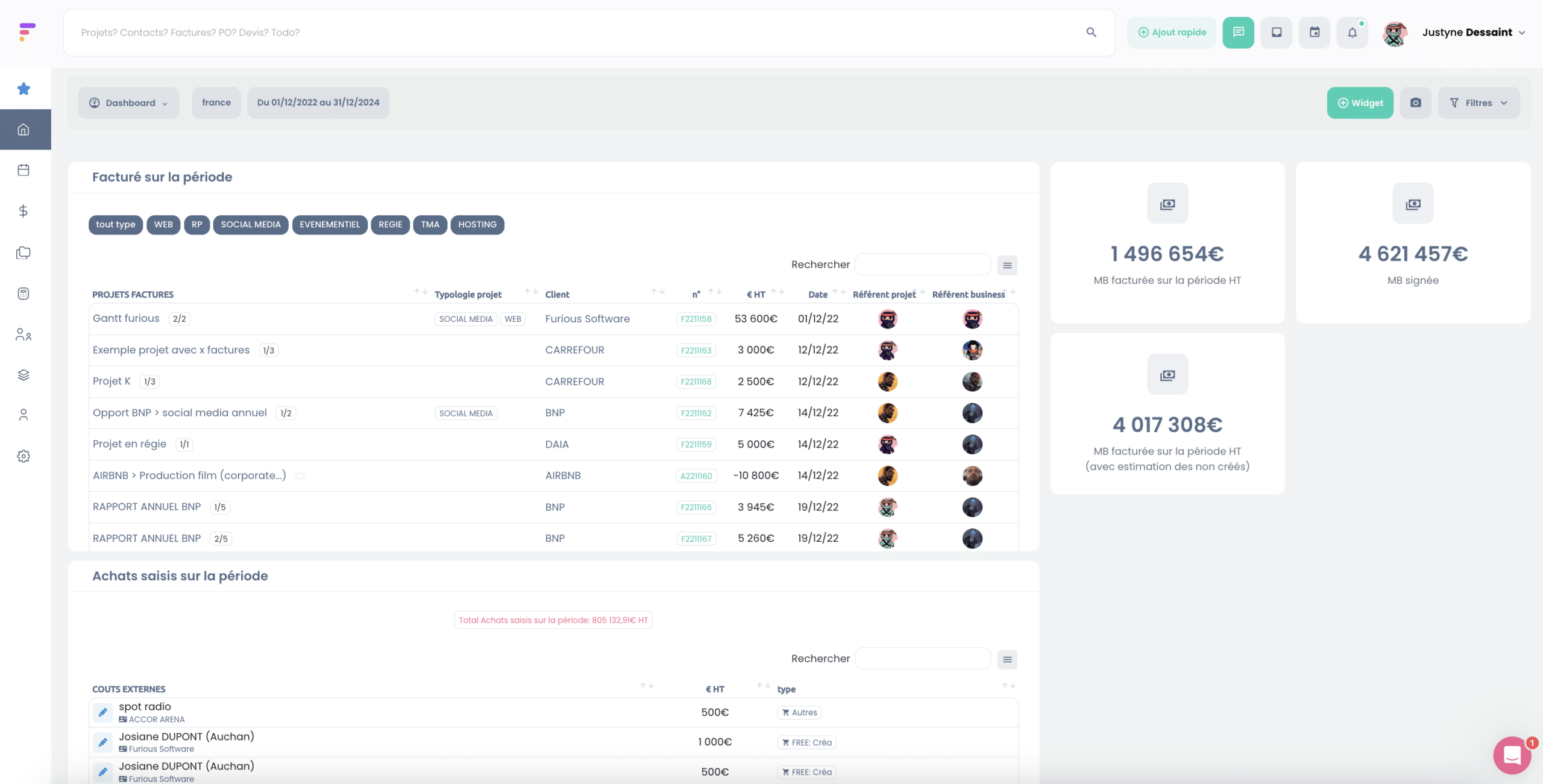Business management software has become an essential partner for companies looking to establish themselves in the modern business landscape. Whether you run a dynamic startup, a creative agency, or a digital services company (ESN), having absolute control over your business operations is crucial not only for ensuring your survival but also for avoiding an agency management problem and fostering flourishing growth.
These solutions go far beyond simple tools; they represent the core of your business, masterfully orchestrating the complexity of your daily operations. They automate repetitive tasks, offer a consolidated view of your business data, and facilitate collaboration within your teams. From prospecting to invoicing, including inventory management and the creation of detailed statistics, this software allows you to:
- Save time on administrative processes thanks to simplified electronic invoicing, automated inventory management, and scheduled email reminders.
- Improve decision-making thanks to intuitive dashboards offering precise analysis of sales data, cash flow, and business performance.
- Increase the efficiency of your sales teams by centralizing customer information, tracking contacts and sales activities thanks to effective CRM (Customer Relationship Management) software.
If you are looking for business management software to propel your company forward, you’ve come to the right place. This guide will provide you with all the necessary information to select the solution best suited to your specific needs. We will explore the key features, benefits, and how these tools can revolutionize your business management, allowing you to fully concentrate on what truly matters: the development and growth of your business.

What is business management software and why is it essential for your business?
Business management software is a technological solution designed to simplify, accelerate, and optimize all of a company’s business processes. By centralizing information, automating administrative tasks, and providing detailed analyses and reports, these tools have become indispensable for any organization wishing to remain competitive in a constantly evolving market. They enable you to:
- Effectively manage customer relationships (CRM), by ensuring precise tracking of interactions, preferences, and the history of each customer or prospect.
- Optimize sales processes, from lead generation to conversion into loyal customers, including quote and order management.
- Improve strategic decision-making thanks to real-time access to precise data and powerful analytical tools.
Adopting such a system is not just a matter of modernization; it’s a strategic approach aimed at strengthening your company’s market position by improving its responsiveness, productivity, and ultimately, its profitability.
What are the key features of high-performing business management software?
For business management software to be considered high-performing, it must offer a range of features designed to cover all of a company’s business needs. Among the essential “killing features” are:
- A simple and intuitive interface: facilitating adoption by all team members and allowing easy navigation through the various features.
- An optimized pipeline view: each sales opportunity is clearly identifiable, and drag-and-drop navigation simplifies the management of prospects and deals.
- Advanced quote management: with digitized pricing grids allowing for automatic generation and modification of quotes, thus ensuring seamless communication with clients.
- Gross margin visualization per project: when editing a quote, the gross margin is automatically calculated, allowing offers to be adjusted to maximize profitability.
- A clear view of closing probabilities: offering a real-time view of weighted pipelines to better prioritize sales efforts.
- Integrations with your favorite software: facilitating synergy with other tools such as HubSpot, Salesforce, Pipedrive, thanks to flexible APIs.
How does business management software optimize sales and acquisition processes?
Business management software optimizes sales and acquisition processes by automating and streamlining key steps, thereby allowing teams to focus on high-value activities. This includes:
- Automation of administrative tasks: reduces the time spent on manual processes and minimizes errors.
- Better lead qualification: thanks to precise customer data analysis, allowing efforts to be focused on the most promising prospects.
- Simplified quote and order management: which accelerates the sales cycle, improves customer experience, and increases conversion chances.
- Real-time insights: on sales performance, enabling strategies to be rapidly adjusted in line with observed trends.
How to choose the right business management software for your business?
Choosing the right business management software involves a careful evaluation of your current and future needs, as well as the capabilities of the proposed solution. Here are some criteria to consider:
- Suitability for specific business needs: the solution must be able to adapt to your company's size, industry, and specific business processes.
- Ease of use and integration: software that is easy for your teams to learn and that integrates easily with other tools used in your company.
- Scalability: the software's ability to evolve with your company, in terms of data volume, number of users, and features.
- Support and guidance: a responsive provider, offering quality technical support and resources to facilitate software adoption.
Why is software customization crucial to adapt to your company's specific needs?
Customization is essential because every company is unique, with its own processes, culture, and business objectives. Customizable business management software allows you to:
- Adapt the tool to specific workflows of the company, ensuring maximum efficiency.
- Precisely meet business requirements, whether in terms of customer management, project tracking, or reporting.
- Evolve with the company's development, by adding features or modifying processes without needing to change solutions.
In conclusion, the choice of business management software should not be taken lightly. Opting for a high-performing, customizable, and well-suited solution for your needs will allow you to transform your business operations and propel your company to new heights of success.
The advantages of integrating business management software into your business strategy
Integrating business management software into your company’s strategy offers a wide range of benefits, transforming not only how you manage your business operations but also the overall impact on your productivity and profitability. These benefits include improved customer relationship management, optimized sales processes, informed decision-making through precise and real-time data, and increased efficiency through the automation of administrative tasks.
How can business management software increase your company's productivity and profitability?
Business management software optimizes your sales process and improves customer relationship management, two key elements for increasing productivity and profitability. Here’s how:
- Automation of repetitive tasks: this frees up time for your teams, who can then focus on higher-value activities.
- Precise tracking of sales opportunities: with a clear overview, your teams can prioritize the most promising leads and increase conversion rates.
- Sales data analysis: understanding what works (or doesn't) allows strategies to be adjusted accordingly to improve overall performance.
The impact on time management and the reduction of administrative tasks
The impact of business management software on time management and the reduction of administrative tasks is significant. By automating processes such as data entry, report generation, and order management, companies can achieve considerable time savings. This allows teams to focus on strategic initiatives, thereby improving productivity and job satisfaction.
Free or Paid Business Management Software: Which One to Choose?
The choice between free or paid software depends on several factors, such as your company’s size, specific needs, and budget. Free software can be a good option for small businesses with basic needs, but it may lack advanced features and support. Paid solutions, on the other hand, generally offer more features, better support, and customization options, which are essential for growing companies or those with complex needs.
Is it possible to find integrated business and accounting management software?
Yes, there is integrated business and accounting management software that offers an all-in-one solution for managing both business operations and accounting. These solutions ensure data consistency between sales and accounting, optimize workflows, and simplify overall business management. Choosing an integrated solution can also reduce the costs and efforts associated with managing multiple distinct systems.
How does online management software facilitate SME management?
Online management software offers unparalleled flexibility and accessibility, which is particularly beneficial for SMEs. The advantages include:
- Remote access: manage your business from anywhere, at any time, which is essential in the current remote work context.
- Real-time updates: information on sales, inventory, and company performance is always up-to-date, enabling quick and informed decisions.
- Data security: online software providers invest heavily in security to protect your data against loss and cyberattacks.
How to ensure a smooth transition to new business management software?
Ensuring a smooth transition to new business management software requires careful planning and clear communication. Here are some key steps:
- Assess needs and choose the right software: involve stakeholders in the selection process to ensure the software meets everyone's needs.
- Plan the transition: establish a realistic timeline, allowing time for training and adaptation.
- Train users: ensure that all users receive adequate training to fully utilize the new system.
- Migrate data carefully: plan data migration to avoid loss or corruption of information.
- Provide continuous support: offer continuous support to answer questions and resolve issues as they arise.
By following these steps, you can minimize disruptions and maximize the benefits of your new business management software.

Testimonials and Case Studies: The Impact of Furious
The adoption of innovative technologies can radically transform how a company operates. It is in this context that the testimony of Frédéric Giraud, President of Jïz Marketing Group, offers insightful perspective on the impact of Furious, an advanced business management solution, on their operations.
-
Challenges: Jïz Marketing Group positions itself as a sustainable marketing group, seeking to prove to both its clients and its employees its ability to develop its subsidiaries while improving its gross margin (GM) and profitability. The company focuses on activation and street marketing, areas involving numerous purchases and likely to encounter operational issues despite well-prepared quotes.
- Adoption of Furious: with an already well-established IT culture, the integration of Furious happened naturally, although it required significant work between the CFO and the subsidiary's head. The rigorous tracking of gross margin per project, one of Furious's strengths, precisely met their needs.
KPIs tracked:
- Gross margin tracking per project, with a caveat on macro visibility
- Purchases representing 60% of the budget
- Revenue and gross margin percentage
Observed impacts:
- Improved project management: the prior entry of purchases and quotes per project allowed for more rigorous management, crucial in a sector where unforeseen on-site events can significantly affect profitability.
- Refined oversight: the improved tracking of purchases and client invoicing now allows Jïz Marketing Group to know the agency's profitability in real time, a considerable advantage for daily management.
- Presales and prospect tracking: automation and precise pipeline tracking have transformed presales management, allowing for more accurate projections and optimizing prospect conversion.
Conclusion: Jïz Marketing Group’s experience with Furious highlights the importance of business management software tailored to a company’s specific needs. Furious’s ability to provide detailed real-time gross margin tracking, combined with its integration into project management and performance monitoring processes, has allowed the company not only to manage its operations more efficiently but also to optimize its profitability. As Frédéric Giraud emphasizes, the relationship with Furious is dynamic and evolving, marked by a constant commitment to improvement and adaptation, making Furious a strategic partner in their growth and success.


